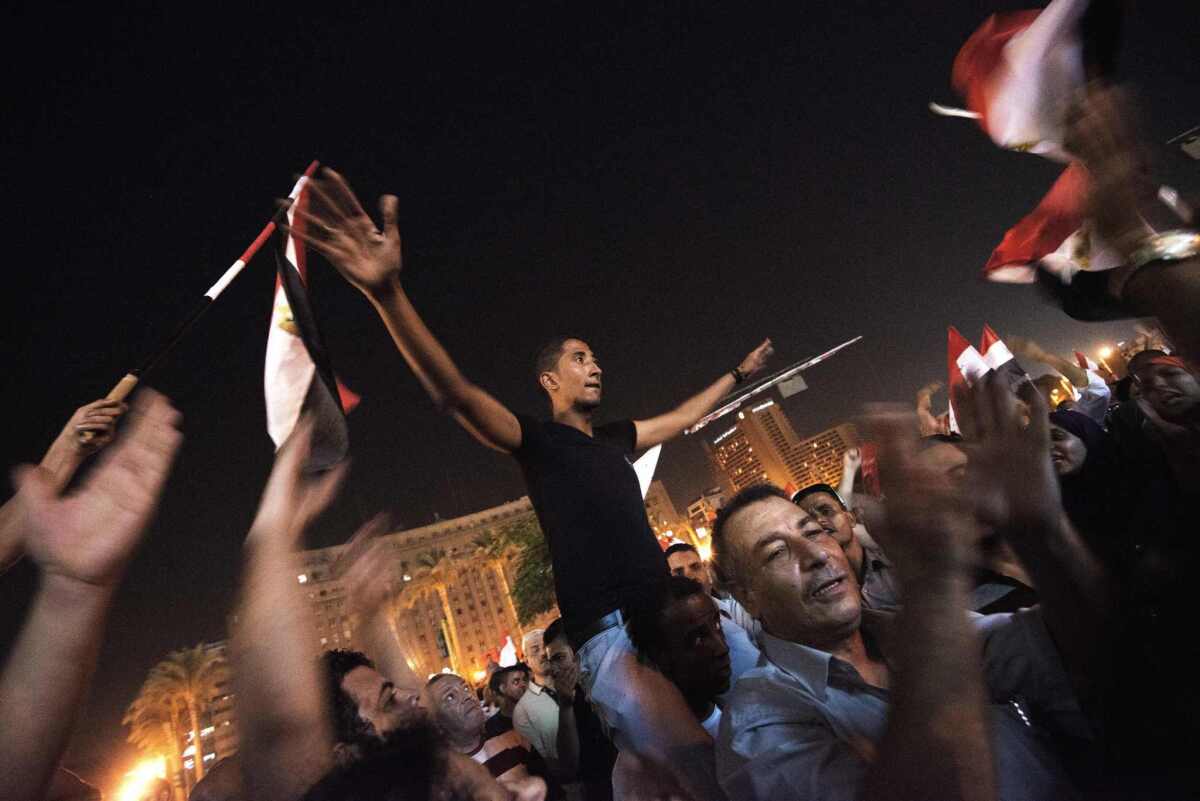In Egypt, massive showdown looms over Islamist rule

Massive protests on Sunday that are expected to draw millions of opponents and supporters of Egyptian President Mohamed Morsi into the streets also promise to be a watershed moment in the brief democratic experience of a country still emerging from decades of authoritarian rule.
The only uncertainty is which tidal force of political outrage will inflict the most damage to the other.
A newly invigorated opposition movement among Egypt’s idle youths has intensified the polarization gripping Egypt since Morsi’s inauguration a year ago as the country’s first freely elected leader.
The emergence of Tamarod -- Rebellion -- and the young activists’ success in amassing 15 million signatures demanding Morsi’s ouster have galvanized the embattled president’s Islamist supporters as well. They vow to turn out in equally enormous numbers Sunday to shout down Tamarod’s demands for a transitional government and early elections.
Rival demonstrations that have gripped Cairo and other northern cities in recent days hint at the passions on both sides and their potential to ignite violent confrontation.
Morsi brooked no compromise in an address Wednesday when he warned that “polarization has reached a state that endangers our nascent democratic experience and threatens chaos.” He conceded that he’d made mistakes in his short tenure in office but cast the political opposition seeking to depose him as aligned with “enemies of the revolution.”
Echoing the president’s warning that the protests are a plot by toppled strongman Hosni Mubarak’s followers to retake power, the head of the Muslim Brotherhood’s political arm, Hussein Ibrahim of the Freedom and Justice Party, denounced the nationwide rallies against Morsi as a call for “bloodshed, violence and vandalism.”
Tamarod has said its protests Sunday, the first anniversary of Morsi’s inauguration, will be vociferous but peaceful. But with tension and acrimony mounting, the prospects for at least scattered clashes would seem likely, Middle East analysts say.
Defense Minister Gen. Abdel Fattah Sisi warned this week that the military stood ready to intervene to protect the president and state property should the crowds threaten them. The armed forces are obliged, Sisi said, to stop Egypt from “plunging into a dark tunnel of civil fighting” or suffering collapse of state institutions.
“The will of the Egyptian nation is what governs us,” Sisi said, alluding to Morsi’s victory at the ballot box. “We are completely responsible for protecting it.”
Both sides in the seething standoff “have mobilized for [Sunday] with severe and strong language. It’s framed as a battle, like they are preparing for war,” said Mohamed Elmenshawy, an Egyptian scholar of the Middle East Institute. He said he is worried about the determination of each side to utterly defeat the other, with Tamarod insistent on Morsi’s resignation and the president’s Salafist and Muslim Brotherhood backers fiercely intent on realizing their long-held dream of a state ruled by the tenets of Islam.
Morsi’s pose as the embodiment of Egypt’s young democracy obliges the military to protect him and the institutions of power if the protests turn violent. But the army’s shield will be applied only as a last resort and reluctantly, Elmenshawy said.
“I know the army is not willing to use force unless it has to. They don’t want a repeat of the mistakes they made during the first revolution,” he said, referring to the quasi-governing role exercised by the Supreme Council of the Armed Forces after Mubarak’s 2011 ouster.
With the new constitution Morsi loyalists drafted last year that won majority backing in a referendum, “the military have everything they want now. The constitution protects their interests, and their economic enterprises are untouched,” Elmenshawy said. “They know if they interfere, in terms of a coup, that they are back to square one” in defining their role in another new political environment.
Against the rising tide of opposition, the Islamists would seem likely to lose their vice grip on the instruments of power if parliamentary elections planned for October were to take place. That is probably why the Islamist-dominated Shura Council -- the upper house of parliament, deemed illegitimate by Egypt’s highest court this month -- has failed to put forward an election law that the judiciary considers in conformance with the constitution, said Michael Wahid Hanna, a senior fellow with the Century Foundation think tank.
In a more mature democracy, the disenchanted masses would be best served by organizing for the legislative vote in hopes of gaining enough seats to push its own agenda, Hanna observed.
But in Egypt elections are “theoretical,” as there is no electoral law or even a realistic date for holding them, Hanna said.
That leaves the opposition with the choice of playing by rules being changed to the advantage of those now in power or taking to the streets again 2 1/2 years after the “Arab Spring’s” most dramatic uprising.
“It’s true Morsi has electoral legitimacy, and it would be bad to topple a democratically elected leader,” Hanna said. “But any democratic society has a certain notion of how electoral legitimacy can be lost. I think many in the opposition would argue that having been elected isn’t enough to sustain the legitimacy of what is now an increasingly autocratic regime, and an incompetent one at that.”
ALSO:
U.S. ambassador to China on rare Tibet visit
President Obama calls slave site in Senegal ‘powerful’
Ecuador quits U.S. trade deal to avoid ‘blackmail’ over Snowden
A foreign correspondent for 25 years, Carol J. Williams traveled to and reported from more than 80 countries in Europe, Asia, the Middle East and Latin America.
More to Read
Start your day right
Sign up for Essential California for news, features and recommendations from the L.A. Times and beyond in your inbox six days a week.
You may occasionally receive promotional content from the Los Angeles Times.







